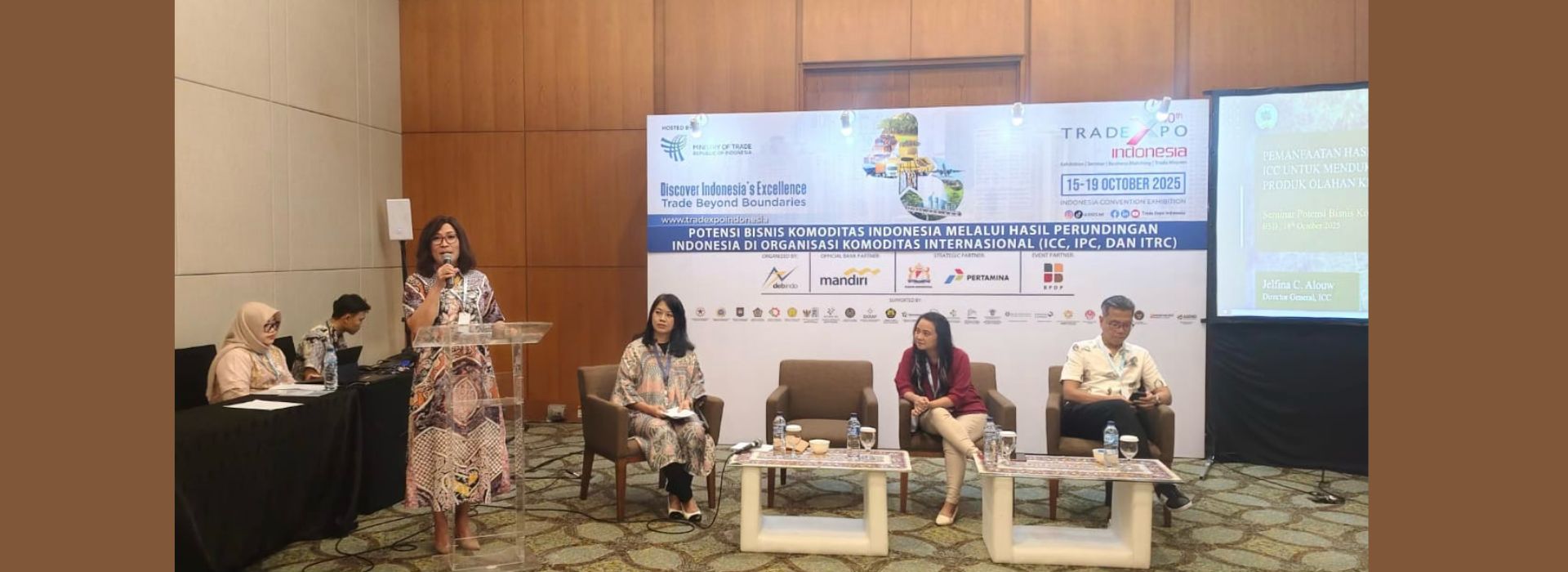The International Coconut Community (ICC) played a pivotal role in a high-level seminar titled "Business Potential of Indonesian Commodities through International Negotiations" held at the 2025 Trade Expo Indonesia on October 18, 2025. Dr. Jelfina C. Alouw, Director General of the ICC, was one of the resource speakers, presenting strategies to leverage global cooperation for the advancement of the coconut industry.
The seminar, organized by the Indonesian Ministry of Trade, took place at the Garuda Room 6A, International Convention Exhibition, BSD City, Tangerang, Banten. It brought together key figures from government and major commodity organizations to discuss how international bodies like the ICC, the International Pepper Community (IPC), and the International Tripartite Rubber Council (ITRC) can be optimilized to boost Indonesia's export potential. It aims to bridge the information gap between international trade diplomacy and domestic business actors, particularly small and medium-sized enterprises (SMEs). Government officials hope to equip entrepreneurs with the latest market intelligence and strategies to enhance the competitiveness of commodities that are vital to the nation's economy.

The event was opened by Mr. Nathan Kambuno, Director of Interregional and International Organization Negotiations at the Ministry of Trade, Republic of Indonesia/Alternate National Liaison Officer, ICC. In his remarks, he underlined the importance of downstreaming and value addition for Indonesian commodities. He highlighted a key achievement through the ICC: the development of a non-standard coconut products as a raw material for Sustainable Aviation Fuel (SAF). Mr. Kambuno also underlined the economic potential of the coconut waste product, such as coconut water.
In her comprehensive presentation, Dr. Jelfina C. Alouw underscored the coconut's identity as the "Tree of Life," whose every part can be utilized. She noted that the global export value for coconut products reached nearly $20 billion in 2024, with Indonesia contributing significantly.

Dr. Alouw identified that the industry's primary bottleneck is not a lack of demand, but rather a shortage of raw materials. To address this, she outlined the ICC's multi-faceted strategy which includes: ensuring a sustainable supply of raw materials through programs for quality planting materials and rehabilitation of aging trees; promoting product diversification and the development of high-value-added products to move beyond traditional exports; facilitating research and development, including innovative non-conventional propagation methods like tissue culture, to overcome seedling shortages; conducting capacity building and training for farmers, youth, and technicians to improve practices across the supply chain; and countering negative campaigns with scientific evidence through the ICC's Scientific Advisory Committee for Health (SACH).
Representing the coconut private sector, Mr. Dipos Naloanro Simanjuntak, Indonesian Coconut Processing Industry Association (HIPKI), confirmed that global demand for coconut products is strong. However, he called for greater synergy in government policy and strongly advocated for a Public-Private Partnership (PPP) model, similar to those successfully implemented in the Philippines and India. A key recommendation from the industry was the need to limit the export of raw materials to ensure the viability and growth of domestic processing industries.

The seminar also featured insights from other commodity leaders. Mrs. Marina Novira Anggraini, Executive Director, International Pepper Community (IPC), who discussed pepper's status as the "King of Spices" and the need to focus on authenticity and value-added products
Speaking virtually from Bangkok, Mrs. Flora Susan, Chief Executive Officer International Rubber Consortium Limited (IRCo), highlighted the need for Indonesia to transition from exporting raw rubber to finished goods like Thailand (tires) and Malaysia (gloves).

The event concluded with a clear consensus on the importance of collaborative action and the strategic use of international platforms like the ICC to address global market challenges and unlock the full economic potential of Indonesia's vital coconut sectors.

